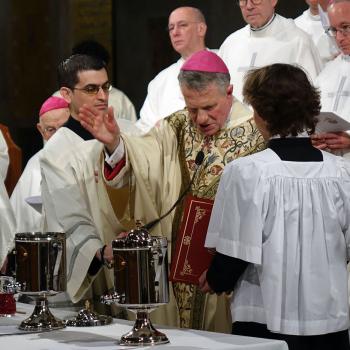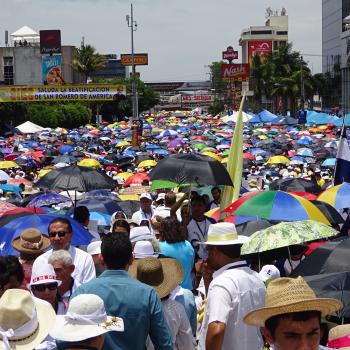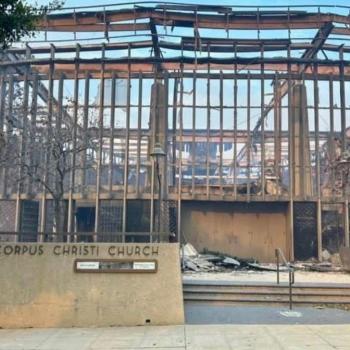The Passion Play of Oberammergau in Southern Germany was first performed in 1633 after the villagers made a promise to God: if the citizens of the village did not die from the plague that was ravishing the region, they would stage the Passion of Jesus Christ every ten years. For 200 years the Passion Play was staged in the cemetery of the village, and due to the growing number of people who came to see it, an outdoor theater was built where the current theater now stands. Today’s theater is a modern facility that is almost totally enclosed – there is no wall behind the stage.
The Passion Play lasts about five hours total with a three-hour interlude during which one has dinner. It is divided into twelve acts with a musical performance in between acts which reflects on the upcoming act with a still depiction of Old Testament scenes. All those involved in the production are natives of Oberammergau or have lived a minimum of twenty years in the village. Despite the grand scale of the performance, it is still a small-town production. Two of the young ladies who served us dinner in the interlude where in the play’s choir.
These are the major points that stood out to me during this beautiful and poignant work:
The large crowd on stage
The sheer number of people on stage is breathtaking. The Passion Play opens with the triumphant entry of Jesus into Jerusalem where at least 250 people of all ages praise him with palms. Jesus rides on stage on a real donkey. Likewise, the crowd when Jesus is presented to Pilate was a real mob. The crowd moves and screams, reacting strongly to the words of Pilate and the members of the Sanhedrin. I found the scene before Pilate to be the most impactful one of the whole Passion Play.
Judas was tricked
The text of the current Passion Play was mostly written by Father Joseph Daisenberger (1799-1883) who was pastor of the village. The text utilizes much creativity especially in the first half of the play in the development of dialogue between the Biblical characters. The most notable creative touch concerns Judas. In the Passion Play, Judas, along with various of the apostles, are dissatisfied because Jesus will not bring about the earthly kingdom of David. Caiaphas tricks Judas, asking him to bring Jesus to him so that they may have a conversation. When Jesus is arrested and taken to Caiaphas, Judas realizes the true intentions of the High Priest so he protests. Due to Judas’ insistence that Jesus should be released, Caiaphas offers him thirty silver coins so he would be quiet. Judas recognizes the mistake he has made, throws the coins on the ground and hangs himself. In summary, you feel sorry for Judas, he too becomes a victim of the High Priest.
Lack of unity
Throughout the Passion Play, it becomes clear that the members of the Sanhedrin did not all think in unison in regards to the ministry of Jesus. There are arguments among the various priests. At the same time, the Play shows a lack of unity in thought among the apostles. This fact offers a very human and grounded reflection on what interactions within these two groups of men could have been.
Death of Jesus
Also of note, was the moment the thieves and Jesus are brought down from the cross. Their bodies are absolute dead weight, and it is impressive to see that the man representing Jesus appears to stop breathing for a long period of time. It is hard to remember that they are amateurs, and not professional actors!
Mary Magdalene and the resurrection
In the same way that Mary Magdalene played a central role in the resurrection account of Jesus, the Passion Play places in her lips a beautiful announcement of resurrection. Once she realizes what has happened, she exclaims, “I will proclaim his resurrection to my brothers, in the midst of his congregation I will praise Him! Wake up, Zion! Put on your best garments, Jerusalem, you holy city! People of Mount Zion, you who live in Jerusalem, wake up! Your eyes will behold the king in his beauty! Your ears will hear him! He was condemned, shunned by people, a man in pain. But God freed him from the sorrows of death and raised him up. I know that my Savior lives! He is with us everyday until the end of the world! That is why my heart rejoices, and my tongue exalts! Oh, if only I could shout it through all the world, so that mountains and rocks and heaven and earth would echo with it: Hallelujah! He is risen!
Closing Thoughts
The Passion Play of Oberammergau is worth attending. The next opportunity to see it will be 2030 when it returns to its proper cycle (it was transferred from 2020 to this year due to the coronavirus). While there, I heard it will be performed again in 2034 to commemorate its 400th anniversary. The Passion Play is a beautiful expression of faith and art – one that not only inspires those who attend it, but I am sure also arouses the faith of the citizens of the village.
Picture taken from here.

















